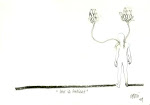The story of the young Abigail unfolds slowly; it meanders, like the maps that she likes to imagine depict her mother. In its unraveling, Abani is descriptive and intense; Abigail’s world is graphic and filled with the translucent ache of desire. It seems as though the younger Abigail is trying to become the older one. Not in terms of personality, but in terms of death; the younger is to become dead. She seems softly haunted by the mother she never knew.
Throughout the novel, Abani gives the impression of her being a walking ghost, and with her branding, she seems to ground herself into her own flesh, as though to reassure herself that she is still herself. And in her self-burning, she becomes an effigy, a kind of tortured doll. But the fact that she inflicts the pain on herself somehow imbues her with power, in a world in which so much has been inflicted on her.
Her story is woven into the city of London, and her actions are sewn up in invented rituals that are both an expression of her grief and a conjuring of death. It is also a poignant look of a black person’s experience of London; her father’s, her mother Abigail’s, and her own. Their relationship with each other and with the city is erotic and violent; death invades each page, each interaction between characters. Through Abigail, Abani reiterates how memory is reinforced through ritual; and repetition is the foundation of all ritual. The ritual of becoming someone that she is not compels her throughout the story. Abani is macabre and bizarre and honest and his descriptions are melancholic and poetic. A beautiful read for a relaxed afternoon.
Subscribe to:
Post Comments (Atom)


No comments:
Post a Comment